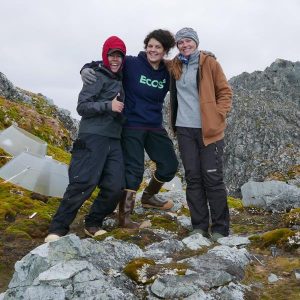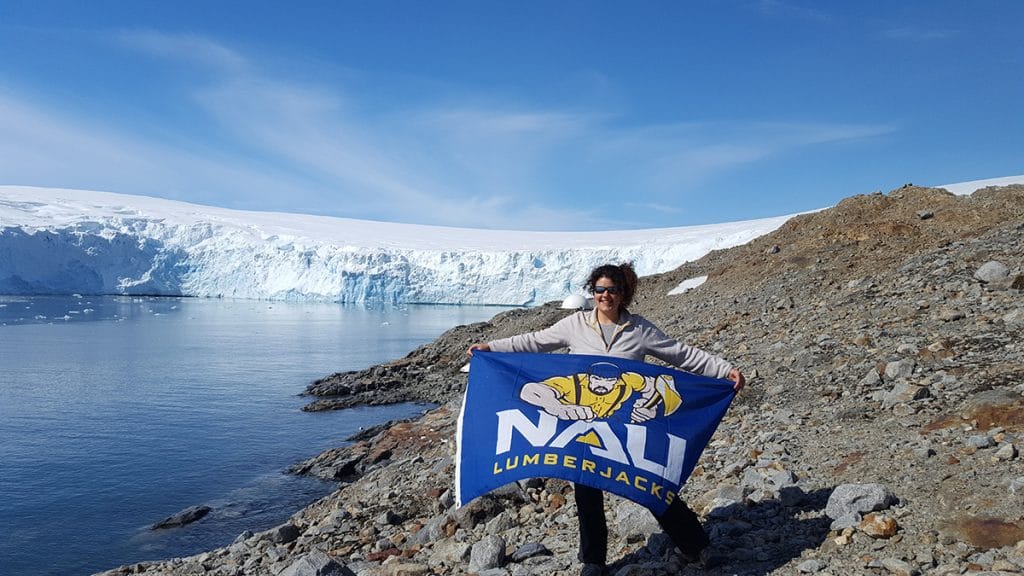Warming global temperatures are changing life on every continent on Earth, including Antarctica, where more microbes are moving into territory previously covered by ice. How these microbes respond to warming will offer clues about what future Antarctica will look like and who will thrive there. Microbial ecologist and Ph.D. candidate Alicia Purcell from the Center for Ecosystem Science and Society (Ecoss) at NAU recently traveled there with a team from Texas Tech to set up a warming experiment in the path of a retreating glacier near Palmer Station on the western Antarctic peninsula.
To test their hypotheses about life in this recently ice-free zone, the team—including Natasja van Gestel, formerly at Ecoss and now at Texas Tech; graduate researcher Kelly McMillan; and Ecoss researchers Purcell, Paul Dijkstra and Bruce Hungate—designed an experiment that would track how much carbon is taken up and released by microbes and plants in this glacier’s wake. This flux experiment went hand-in-hand with Purcell’s questions about microbial activity.
Early results from Purcell’s work suggest that Antarctic microbes grow faster in warmer deglaciated places, giving us clues to how ecosystems will function in a less icy Antarctica. That is the direction the peninsula is headed: 87 percent of glaciers there have retreated over the past few decades. “The Antarctic peninsula is the least stable part of the continent, and it’s warming the fastest,” Purcell said. “That’s one reason studying peninsula environments is important: we are really trying to develop a clear picture of this place before the frame changes again.”

Purcell and the team staged their warming experiment in four plots in the deglaciated till, or track, of the Marr Ice Piedmont, a glacier that has retreated 500 meters since 1960. The oldest and furthest plot from Palmer Station, Litchfield Island, is now covered with lichen and moss. The team placed cores of soil containing specially-labeled water in covered and open-top control chambers and waited 28 days. Purcell then packed up the cores and sent them back to the lab in Flagstaff, where she is using a technique called field qSIP (quantitative stable isotope probing) to see which bacterial taxa took up the isotope-labeled water to grow.
Working from Palmer Station was an immersive scientific experience, Purcell said. She lived alongside 40 other researchers and staff at Palmer Station for a month in the Antarctic summer of 2019. The research station hosts a diverse group of scientists each season, and Purcell, McMillan and van Gestel ate meals with and learned from other researchers studying paleoclimate, ocean nutrient cycling, weather and climate patterns, birds, plankton, whales and seals. If someone needed an extra hand with an experiment, they could seek volunteers using a whiteboard in the common area.
On days between conducting their experiments, Purcell, McMillan and van Gestel took a Zodiac boat out to tour ships anchored nearby to talk about their research. Purcell was moved by how concerned these tourists were about the ways climate warming is changing Antarctica. “It was touching to be part of that answer for people.”
Still, there’s an uncanniness about studying some of the terrain being altered fastest by climate change, Purcell admits. “The first time I heard a glacier calve, I thought it was thunder. It was happening almost every 30 minutes.”
But the changing climate in this remote region of the world also represents a rare opportunity for Purcell and other microbial ecologists.
“It’s an unexplored ecosystem in a way,” she said. “We know very little about microbial activity in and around icy environments and what that really means.”
Purcell hopes to pursue this line of research, and Ecoss scientists and van Gestel have applied for a National Science Foundation grant that would allow them to return to Antarctica and continue the warming experiment.
Learn more about the team’s work and see photos on van Gestel’s blog.
Kate Petersen | Center for Ecosystem Science and Society
(928) 523-2982 | kate.petersen@nau.edu




